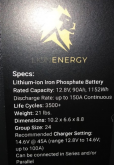erik.calco
Solar Badger
I plan to put 4 of these Lion Energy UT 1200s (photo below) together for a 2P2S 24V bank. How would you configure charge rates and size battery cables and fuses for peak discharge rates?
My assumption would be to double everything so
- discharge rate: 300A max continuous (2P)
- charge rate: 90A ideal with max 200A charge rate (2P) obviously at double the voltage range (2S).
Is this correct?
- Can someone recommend a good fuse for this configuration? Leaning towards 4/0 cable. Starting with 2.4kwh inverter, but plan to double to 5kwh. Will's recommendation of Windy Nation only goes up to 300A. If continuous can go to 300A, then I'd think this should be at least 400A. (EDIT: found 400A ANLs. Can start with 300A and change if needed. But, finding an ANL fuse holder for 4/0 isn't so easy.)
- How about good short cables for connecting in series? I haven't been able to find any really short cables. I was thinking maybe 6 inches.
I plan to buy all cables with lugs on them because I do not have the tools to crimp welding cables.

My current collection of cables and connectors research
My assumption would be to double everything so
- discharge rate: 300A max continuous (2P)
- charge rate: 90A ideal with max 200A charge rate (2P) obviously at double the voltage range (2S).
Is this correct?
- Can someone recommend a good fuse for this configuration? Leaning towards 4/0 cable. Starting with 2.4kwh inverter, but plan to double to 5kwh. Will's recommendation of Windy Nation only goes up to 300A. If continuous can go to 300A, then I'd think this should be at least 400A. (EDIT: found 400A ANLs. Can start with 300A and change if needed. But, finding an ANL fuse holder for 4/0 isn't so easy.)
- How about good short cables for connecting in series? I haven't been able to find any really short cables. I was thinking maybe 6 inches.
I plan to buy all cables with lugs on them because I do not have the tools to crimp welding cables.

My current collection of cables and connectors research
Last edited:


